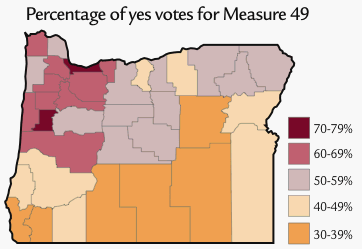The strongest influence on the Feb. 4-29 interim legislative session is probably the primary election cycle, which kicks off literally days after the session ends.
SALEM The strongest influence on the Feb. 4-29 interim legislative session is probably the primary election cycle, which kicks off literally days after the session ends. Elections, it could be said, do not engender political risk taking. But the results of the Nov. 6 vote may also have a role in how the session plays out.
The lessons of Nov. 6 were unsurprising: Oregon voters care deeply about land-use issues and do not like taxes. However, political analysts such as Jim Moore and Bill Lunch say that Measure 49’s win just might give the Democrats some traction with environmental issues — like extending provisions of the bottle bill.
“[Measure] 49 won on the feeling of what it is to be an Oregonian and what it is to live in the Oregon environment. Bills like the bottle bill are clearly something people in Oregon love,” says Moore, a professor in Pacific University’s Department of Politics and Government.
On the flip side is Measure 50. Its decisive failure means it’s unlikely House Democrats will be able to pass any kind of tax during the session. While Democrats have the majority in the House, they lack, by five votes, a large enough majority to create a tax. Blocked by the GOP’s five-seat advantage, Democrats will have to look to 2009 when they may be able to pick up those seats, says Lunch, chair of Oregon State University’s Political Science Department. (“Ambitious,” is how he described that goal.)
Another influence on the session might come from outside of the state, Moore says. On a national level, Republicans are forcing Democrats to take stands on the same issues facing Oregon’s Legislature, such as health care. Oregon Republicans are going to be able to see how that strategy plays out on a national level before the session begins, he says.
And for those who think the electorate in November 2008 will have forgotten what their legislators did in the special session, Moore brings up how Republican political groups tried to keep voters’ memories refreshed by sending out attack-ad mailers in Democrats’ home districts during the last legislative session — nearly one year before the primaries.
Bob Eisinger, chair of the political science department at Lewis and Clark College, thinks that in the end, there’s very little that can be extrapolated out of the Nov. 6 vote. Which party is in the strongest position going into February? What compromises will come out of those three weeks? Who has the leadership that will shape whatever issues the Legislature decides to work on?
“We’re not sure what team is in the scoring zone,” he says of the Democrats and Republicans. “We’re not even sure what team has the ball.”
ABRAHAM HYATT
Have an opinion? E-mail [email protected]


